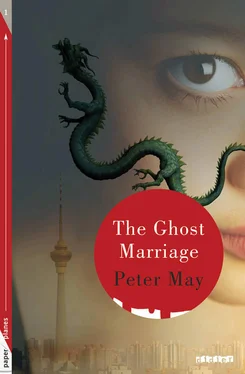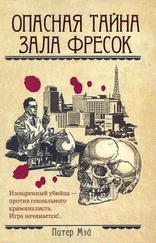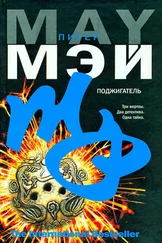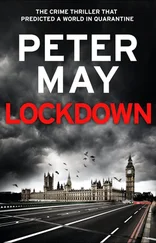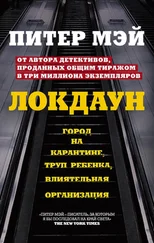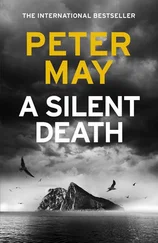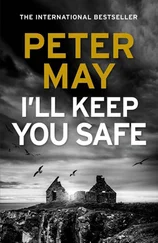‘So money changes hands.’
The white-haired old professor nodded and smiled. ‘I know, I know. It is illegal to buy and sell bodies, but it happens.’
‘Even in Beijing?’
‘Unlikely, I would have thought. Unless you had a community of families from an area of China that practised the minghun .’
Which was exactly, Li thought, what he had discovered among the condemned urban slums of Haidian District.
Li and Wu arrived back at Section One at almost exactly the same moment. As Li wheeled his bicycle under the stand at the side entrance, Wu pulled his Beijing Jeep into the kerb and jumped out on to the sidewalk. His sunglasses were down, and he was chewing gum enthusiastically, evidently pleased with himself. ‘Got our man, Chief.’
‘Which man is that, Wu?’
‘Our anonymous letter writer. Did just as you suggested. Lifted fingerprints off the letter. There were four sets. I took copies of all four up to Beida and ran them past the scanner. Bingo. Up pops an ID. Feng Qi. Second-year student. He’s working at the university over the summer, and still living at the student residences there.’
Li raised one eyebrow and bowed his head to acknowledge a job well done. ‘Better bring him in, then.’
‘The uniforms are already on their way, Chief.’ Wu grinned happily.
Feng was sitting nervously on his own at the table when Li and Wu came into the interrogation room. Anxious dark eyes jumped in their direction. He sat uncomfortably on the edge of his seat, leaning forwards a little, and wringing his hands together. ‘You can’t hold me here like this. I have rights.’
Li sat down opposite him. ‘You’ve been reading too much Western detective fiction, son. You have no rights. It is your duty to help us in our investigation and tell us what you know. Failure to do so will only plant in my mind the presumption of your guilt.’
‘I have nothing to hide.’ He tried to sit up straight and present a defiant face.
‘Then why did you write to us anonymously?’
The young man’s fear that he had somehow been identified was finally confirmed, and his defiance foundered, along with his posture. He started to wring his hands again. ‘I didn’t want to get involved.’
‘You are involved.’ Wu pulled up a chair and sat down beside Li. ‘Witness to a possible murder.’
Feng Qi paled, and with Wu’s words, Li for the first time let himself countenance the thought that Jiang Meilin was actually dead. In his mind he saw her smiling photograph from the medals cabinet, and felt her mother’s pain. Margaret’s plea for him to look into the disappearance of a teenage girl had turned suddenly from a favour into a murder enquiry. ‘Better tell us everything you know, son,’ he said.
Feng glanced from one to the other. ‘Can I have a cigarette?’
Li nodded to Wu, who reluctantly offered them each a cigarette, then passed his lighter around. Blue smoke rose through the hot, still air into the shaft of light that fell at an angle from the narrow window high in the wall.
Feng said, ‘Sheng Wei and I were at university together. I’d known him since we were kids back in Shaanxi. My parents moved to Beijing when I was seven, and I didn’t see him again till he appeared one day at my middle school. His family had come to the city, too, and were living in a place just down the street.’
‘You were both from the Loëss Plateau?’
‘Sure.’
‘How many people from the plateau live in that area of Haidian?’
The young man shrugged. ‘I’ve no idea. People have been coming here for a couple of generations now. There must be hundreds, maybe thousands.’
‘So tell me about Sheng Wei.’
A cloud, like cataracts, crossed the boy’s eyes. ‘He was killed in a motorbike accident about ten days ago.’ His lips tightened as he drew a deep, trembling breath. ‘Wei was so smart. He had a great future. Everything to live for. It was a tragedy.’ Feng shook his head. ‘I thought I was going to his funeral. It turned out to be his wedding.’
‘A minghun ?’
He nodded. ‘Bizarrest thing I ever saw. Paper dummies, all dressed up in traditional wedding costume. The spirits of the dead, to be burned after the ceremony and sent to the afterlife as man and wife. There was a priest and everything. Proxy wedding vows, rings, the lot. Sure, I’d heard about it. But I assumed it was one of those urban myths. Just a story.’ He closed his eyes for a moment, trying to control his breathing. ‘You’ve no idea what it was like seeing Wei lying there in his coffin. And that dead girl in the coffin next to his. The minute I saw her I knew it wasn’t right.’
‘You knew her?’ Wu said.
‘From school. She was about three years behind me. A pretty girl. Kind of quiet. I heard she was doing well in athletics, that she could be up for a scholarship. I was sure I would have heard something if anything had happened to her.’ He looked at Li, an appeal for understanding in his eyes. ‘But there she was. Wei had been killed in an accident. I had no reason to think that something similar hadn’t happened to her, too.’ He paused. ‘Until I saw the Missing posters.’ He closed his eyes again and summoned the courage to ask the question that had been troubling his conscience all this time. ‘You don’t think they killed her, do you?’
Li’s mouth was fixed in a grim line. It was some moments before his lips moved. ‘Someone did.’
Lianxiang hutong was yet another ancient alley scheduled for demolition. Little by little the authorities were effacing the city’s history, the labyrinth of hutongs and siheyuan that denoted a way of life dating back to the Mongols. Already most of it was gone, replaced by luxury apartments and shopping malls. A new generation of wealthy Chinese was replacing the old Beijingers, and the floating population from all around China which had descended on the city looking for work was being swept away. Where, Li wondered, would they all go? Where would they live? After all, not everyone could be rich — even if Deng Xiaoping had declared it glorious to be so.
He pushed his bicycle along the narrow alley, between high stone walls, until he found the gate to the condemned siheyuan occupied by the Sheng family. In the dark alley leading to the courtyard beyond, he leaned his bicycle against the wall and squeezed past the detritus of disposable lives. The tree shading the courtyard was decorated with bamboo bird cages, and in the confined space the sound of birdsong was almost deafening. The singing was accompanied by the discordant sounds of a piece from the Peking Opera playing on a radio somewhere in the dark beyond open windows and doors. Heat fibrillated in the thick summer air. A very old lady, dressed entirely in black, sat sleeping in the shade.
‘Hello!’ Li called out. And after a short time a middle-aged woman in a blue blouse and red cardigan emerged from the south-facing door. She looked at him curiously for a moment, before curiosity gave way to fear as realization dawned.
‘Can I help you?’ But she knew what he wanted.
‘Yes,’ Li said. ‘You can tell me where you got the body of the girl you married to your dead son.’
Sheng Nuwa and her husband Dai sat side by side in the semi-dark and comparative cool of an inner room, its window shutters closed, the only light spilling in through an open door. Both faces were ghostly pale as they surrendered to Li’s hard gaze. Li wondered if this was, in fact, the room where the minghun had been played out. Feng Qi’s description of the odour had stayed with him, and he wrinkled his nose at the thought of it.
Читать дальше
